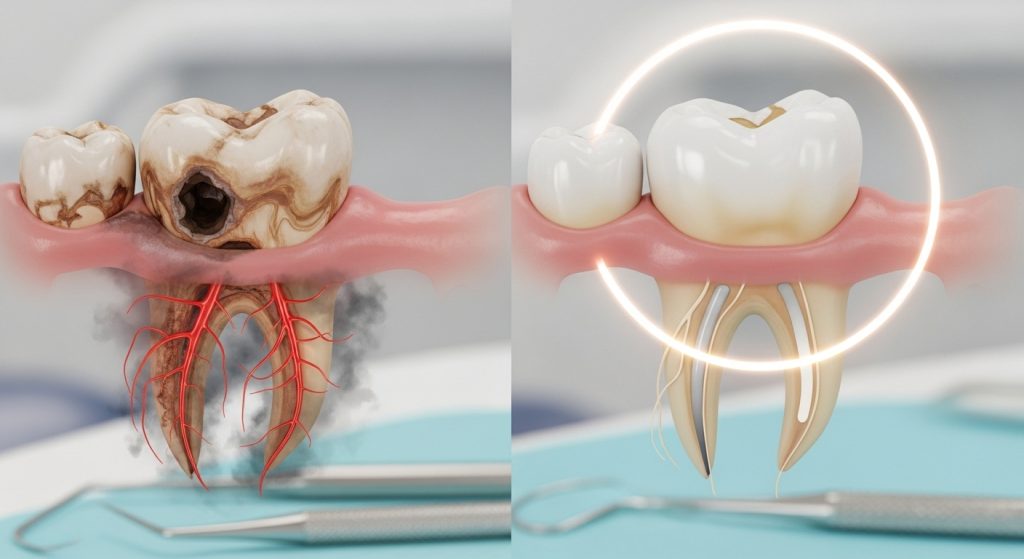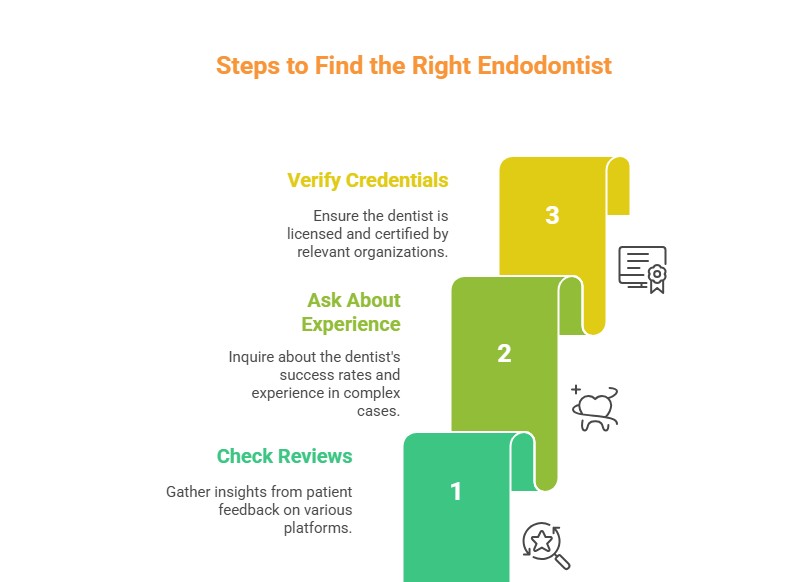One of the most renowned tooth-saving procedures is root canal therapy. Given the importance of this procedure, selecting the best dentist for root canal therapy enables you to restore your damaged tooth and regain your dental health. Nevertheless, finding the best dentist for root canal treatment in a vibrant and hectic city like Toronto, with countless professionals, can feel overwhelming.
In this guide, we will explore the must-have expertise of a suitable professional, what questions you must ask them, and how to find your perfectly skilled dentist to ensure the best care and a fast recovery.
Why Choosing the Best Dentist for Root Canal Therapy Matters
The root canal procedure entails removing infected or damaged pulp from inside a tooth, cleaning and disinfecting the canal, and sealing it to prevent other issues and give it a natural look. Regarding the intricate steps of this treatment, a precise and well-equipped dentist can significantly affect your procedure’s success and your comfort.

To put it in simpler terms, when we say the best dentist for root canals, we mean a skilled professional who bridges the gap between a pain-free experience and a lasting outcome, thereby minimizing complications such as reinfection, persistent pain, or even tooth loss.
An experienced dentist allows you to have your procedure done adequately with next-to-zero discomfort and a fast recovery time. Furthermore, well-equipped professionals, such as those with 3D imaging or rotary instruments, have better precision, while their compassion will help reduce patients’ anxiety and fear.
Key Qualities to Look for in a Root Canal Specialist
Not all dentists are equal when it comes to root canal therapy! Let’s review some of the most essential qualities that your root canal dentist must have:

Experience and Training in Endodontics
Endodontists are specialists who have completed at least two years of advanced training beyond dental school. Their advanced programs focus exclusively on procedures like root canals.
While general dentists can also perform root canals, endodontists are more specialized in complex cases, such as those involving curved canals, multiple roots, or teeth that have not been adequately treated.
Suppose you decide to look for a professional endodontist due to their probable higher success rates or better handling of challenging cases. In that case, you can search in the Royal College of Dental Surgeons of Ontario (RCDSO) or for membership in the Canadian Academy of Endodontics.
Advanced Technology and Techniques
With the advancing technologies, these procedures have also become more accurate and comfortable, making it easier for patients to locate the closest and best dentist for root canal treatments.
Nowadays, top-notch dental clinics exploit several of the following technologies and techniques to enhance their outcomes:
- Digital X-rays and 3D CBCT Imaging: These provide detailed views of the tooth’s internal structure and probable tooth decay to help dentists with more precise procedures.
- Dental Operating Microscopes: This tool allows for magnification and meticulous cleaning of the root canal system.
- Rotary Endodontic Instruments: These tools enable the procedure to be faster and more efficient than traditional hand files.
- Laser-Assisted Endodontics: Some specialized clinics use lasers for enhanced disinfection.
Good Communication and Patient Care
A great dentist prioritizes clear communication and patient comfort. They should explain the procedure in simple terms, outline potential risks, and provide root canal aftercare instructions.
Look for a professional who listens to your concerns, offers sedation options for anxiety, and fosters a welcoming environment. Patient-centered care is especially crucial for root canals, as many patients feel nervous about the procedure, its risks, and the potential for discomfort and pain. A dentist who takes time to build trust can significantly improve your experience.
| Quality | Why It Matters | What to Look For |
| Experience in Endodontics | – Handling complex cases – Higher success rates | – Board certification – Years of practice – Number of root canals performed annually |
| Advanced Technology | – Improves precision – Reduces discomfort – Speeds up recovery | – Digital X-rays and 3D imaging – Rotary instruments – Dental microscopes |
| Patient-Centered Communication | – Reduces anxiety – Builds trust – Clear explanations and empathy | – Sedation options – Detailed consultations – Positive patient reviews |
Looking for The Best Dentist for Root Canals?
Wondering about the root canal equipment in the Walk-In Dental Clinic?
Book an online consultation to discuss your required services and efficient tools!
How to Find The Best Dentist for Root Canals in Toronto
In crowded cities like Toronto, dental services offer many options. However, if you need to find the right endodontist for your needs, you must do your research! Let’s see how you can identify the best dentist for root canals who serves your specific needs:

Checking Reviews and Testimonials
One guaranteed approach to finding any people-centered service is learning about the people’s experience!
Patient reviews on platforms like Google, Yelp, or RateMDs provide valuable insights into a dentist’s skill, professionalism, and patient care.
Check out your selected professional’s consistent feedback about successful root canal treatments, minimal pain, and a welcoming clinic environment.
Pay attention to comments about the dentist’s ability to explain procedures or handle anxious patients.
It’s essential to note that a single negative review doesn’t disqualify a professional from performing this procedure. However, if you detect a pattern of patient complaints about poor outcomes or unprofessional behavior, you should raise a red flag.
Asking About Their Success Rates and Experience
Before booking your procedure appointment, schedule a consultation to ask the dentist specific questions about their experience.
You can ask:
- How many root canals do you do annually?
- What is your success rate for root canals? (A rate above 90% is typical for straightforward cases.)
- Have you handled complex cases, such as retreated root canals or molars with multiple roots?
By asking questions, you achieve two goals: first, you gain insight into your selected dentist’s experience. Second, and more importantly, you can build trust since a reliable professional is always open about their track record.
Verifying Credentials and Certification
You can check out your dentist’s license in the RCDSO, which you can verify through their public register.
Verify board certification or membership in professional organizations, such as the Canadian Academy of Endodontics. Confirm that the clinic adheres to strict sterilization and safety protocols, which are critical for procedures like root canals. You can also ask if the dentist has additional certifications in advanced techniques, such as laser dentistry or sedation.
Questions to Ask Before Your Root Canal Appointment
It’s only natural to always feel nervous about your dentist appointment! You can meet with your dentist for a consultation to discuss your concerns and gain a clearer understanding. Here are some critical questions to ask your dentist or endodontist:

What is the Expected Recovery Time?
The typical recovery time for a simple root canal is usually between a few days and a week. Most patients also feel mild discomfort, which is managed by over-the-counter pain relievers like ibuprofen. You must consult your dentist if you experience severe nocturnal toothaches. However, recovery time can vary based on the tooth’s condition, the complexity of the procedure, and your overall health.
We recommend that you ask your dentist for a personalized estimate and specific aftercare instructions, such as avoiding hard foods and maintaining good oral hygiene to prevent infection.
How Will the Procedure Be Managed?
Learning about the root canal process in simple terms can help you map out your concerns and reduce your anxiety.
If you worry about your anxiety or severe discomfort, ask your dentist about the type of anesthesia they use. Clinics usually use local anesthesia for simple root canals. However, they can also include nitrous oxide for mild anxiety and intravenous sedation for severe anxiety.
Determine whether the dentist utilizes modern tools, such as rotary instruments, digital X-rays, or dental microscopes, to ensure precision and efficiency. For instance, clinics offering oral surgery in North York often integrate these advanced techniques to streamline the process and enhance patient comfort.
Inquire about the procedure’s duration, which typically takes 60 to 90 minutes. Nevertheless, complex cases may require more time.
Last but not least, discuss how you can manage post-procedure pain, their recommended pain medication, and potential root canal side effects that you should watch for.
Trust Your Dentist for a Successful Root Canal
Finding and booking the best dentist for root canal treatment in Toronto is a crucial step toward ensuring a successful procedure and a comfortable recovery. You can identify a suitable professional dentist to meet your needs if you prioritize experience, advanced technology, and patient-centered care. Use online reviews, search their credentials, and ask targeted questions during your consultation to make an informed choice.
FAQ
-
How do I find the best dentist for root canals in Toronto?
Look for reputable clinics, research endodontists, or dentists with specialized training in root canal therapy.
Check reviews on Google or Yelp, verify credentials through the RCDSO, and ask for referrals from your general dentist. -
What qualifications should I look for in an endodontist?
Look for an endodontist with at least two years of advanced training, board certification, and membership in organizations like the Canadian Academy of Endodontics. Verify their license with the RCDSO.
-
How do I know if my dentist is experienced in root canals?
Ask about their annual root canal volume and success rate (ideally above 90%).
Check reviews for feedback on their expertise and outcomes. Experienced dentists will openly share their track record. -
Are all dentists capable of performing root canals?
Most general dentists can perform root canals, but endodontists have specialized training for complex cases.
For challenging procedures, such as retreated root canals or molars, an endodontist is often the better choice.
Have you ever searched for the right dentist in Toronto for a root canal? Share your tips, questions, or experiences in the comments so others can learn from you.



